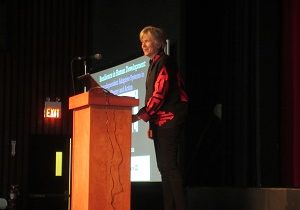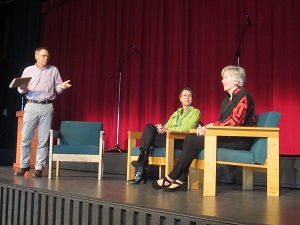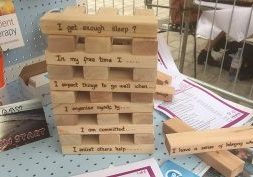Boingboing blogs from… Halifax
Ann Masten keynote at the Pathways to Resilience III Conference, Halifax, Canada! Thursday 18 June 2015
by Angie Hart – Boingboing blogger
Angie here again. Sunny morning in Halifax, Nova Scotia. You ever heard of Ann Masten? She’s mega famous in my world. I’m listening to her speak right now. She’s a US psychologist, working mostly on human development, and has just written a new book called Ordinary Magic. Ann’s been working on resilience for so long that she’s now won a lifetime award for it. Congratulations Ann. I’ve sent her a couple of emails in my time, one about seven years ago and the latest a paper we’ve written on our fifth wave resilience concept. But sadly she’s not yet responded. Ann’s going to talk about what’s been happening in the resilience field and her take on this. Pause for Ann’s definition of resilience:
‘Capacity of a system to withstand or recover from significant disturbances that threaten its adaptive function, viability, or development.’
So for her, resilience can be applied to any system, including organisations, internal systems inside human beings and even computers.
Ann’s interested in the way children’s lives are embedded in all kinds of different systems which both interact with each other, and are also interdependent. So kids are in classes, schools, local communities, countries, the world, the universe, who knows what beyond. She mentions how complex kids’ inner systems are, what make up their internal selves. But for Ann, resilience is not a trait. It’s dynamic. You aren’t just born with it. Oh no siree. So just take that smug look off your face if you think your resilience is only down to you.
Although hang on a minute. Ann’s just mentioned a couple of ‘traity-type’ things that help with resilience, though you can get by without them – musical talent and a sense of humour. Note to self. Must get that recorder out again and compose a new little ditty.
One chart she shows demonstrates that kids living in poverty in her school district start their early years with very low reading scores and never catch up with kids who aren’t, although even within those groups there will be some who do better than others. But still, what a disgrace that is. Wassilis my lovely Greek/German Professor friend is sitting next to me. He nudges my arm, ‘This is a fifth wave point’. ‘Indeed’, I agree. Have a look at our last Cindy Blackstock blog post if you think we’re discussing the ocean.
Ann Masten says that in the midst of severe chronic adversity you can’t see kids’ resilience. Only when conditions improve can you see some recovery. I’m not sure about that. Betancourt and colleagues have done work on the internalizing symptoms of Sierra Leonean Youth affected by war. Most of them are doing well post-war, so what is it about their circumstances that is enabling them to emerge relatively ok, asks Ann.
We then get a bit of chat about the idea of cascades. Spreading effects over time, across domains of function, systems and generations. In our language, that’s about how resilient moves get carried on to other places and spaces. So something good that happens for one family member for example can have a knock on effect for others.
I’m liking this bit. We’ve been thinking about this a lot. She introduces the idea that intervention effects can grow and spread. So even a single thing that you might do, like say a training course for parents, can have wider effects, not just on their parenting, but other aspects of their lives, like getting a job for example. Ann illustrates this with some data from Beldavs and colleagues writing on a parenting intervention in 2006. Looking at the chart, I imagine that some of the parents ended up sorting out their drug issues, the parenting intervention didn’t just help them to stop screaming at their kids.
Ann Masten’s winding down now. She lists her top things in the universe that promote resilience. Her list looks so like ours. There are thousands of lists out there. Again let’s summarise. Good relationships, especially from caregivers. Problem solving skills. Great schools and communities.
Her resilience framework for action. The five Ms so it’s easy to remember. M1: Mission. We need to frame positive goals, not just look for things that are going wrong. M2: Models. We need to set up ways for kids to have positive influences. M3: Measurement. You need to measure how you’re managing to achieve those goals and see how well people are doing, rather than going on about what they aren’t getting right. M4: Methods of intervention need to be about preventing problems, promoting positive things and protecting. M5 Multiple. Finally you’ve got to do this at multiple levels (family, school, etc.) and people across different disciplines need to get involved. I’m with her nearly all the way. Don’t like this idea of disciplines. What about citizens? Community members nearly always get left out. They are just as capable as people from professions. Can we please get away from the idea that they are just the recipients of ‘our’ interventions. Please, please.
Her strategies for positive change? First, doing anything to reduce risk or avoid adversity exposure. Second, to increase positive assets by injecting external resources, like smaller school classes for example. Then she goes on to get excited about process focused systems. Placing children for adoption is getting kids into one of the most powerful adaptive systems known to human kind, a loving family. A great example of a process focused system. Emily, a boingboinger, is chatting to me, ‘What about activism as an adaptive system for change?’ We’ve been doing some research in our group on that folks so check us out.
Ann Masten’s getting excited as she finishes off. There are so many windows of opportunity where we can jump in and do something. Think high plasticity (when kids are most amenable to things changing) and multi-system change – so for example prenatal periods and early childhood have high return on investment. ‘Think Harlem Children’s Zone’, I say (to myself, don’t worry I’m not disturbing her talk).
She started off talking about poverty and reading ages, but she’s ending on what’s called ‘executive functioning’, the ability of kids to sit down and listen, take turns in class, tidy up their school bag, etc. These are all things that can be learned, even by very young kids who are jumping around all over the place. And some of their executive functioning skills are learned from parents (or not!), so worth getting parents together to have a think about how they can sort this out in their own lives too. Ann’s group gets the homeless parents who struggle with their own executive functioning to play card games with their kids to assess how they are all doing. And now I’m feeling a bit despondent. No mention again of the disgrace of poverty. I imagine Ann’s researcher students waving their card game box at a parent who doesn’t know where the family’s next dinner is coming from. Reminds me of when my kids were young. I’m a parent of three children adopted from the care system. We had a lovely lady coming round from the Portage service to check up on how well we were filling out some forms. Each week we had some tick boxes to complete, centred around tasks we were doing to support our three-year old’s development. One week we had to help her learn the word ‘milk’ and tick how many times we’d done it.
Confession time now. I forged the form. Sorry Portage lady. We hadn’t done anything that week. I was too busy scrabbling around doing basic cleaning, trying to get some meals cooked, stopping the kids climbing the walls. And I’m a well-resourced person with loads of money. So look, I’m not saying don’t do the card games with parents and their kids. There is a place for it I know. But could you please acknowledge the disgraceful poverty they are living in and tell us what you’re doing alongside the card game to secure some basic housing for some of these homeless people you’re working with. The research record on the effects of poor housing are overwhelming – we can argue the toss about whether or not that’s more important than executive functioning. So what responsibility should we take as resilience researchers to the people we are working with beyond our discrete experiments? Please, please can we address that? Anyone for a fifth wave approach?
Sorry Ann. Perhaps I’ve done you a disservice. A question from the audience comes on what responsibility we have to address inequalities in society rather than focusing on individual behaviour. Ann thinks we researchers have a big responsibility here and she says we should be bringing homelessness to the attention of policy makers. When she started working on homelessness she thought it would go away and how rubbish that it hasn’t. I’m fascinated by this. It would have been good to have had something about that on Ann’s slides. I’m so interested to hear what Ann and her team are actually doing about this. I’m really keen to hear what the policy makers said too. Ann, would you email me to let me know? Pretty please. Seems just as important as the card game to me.


